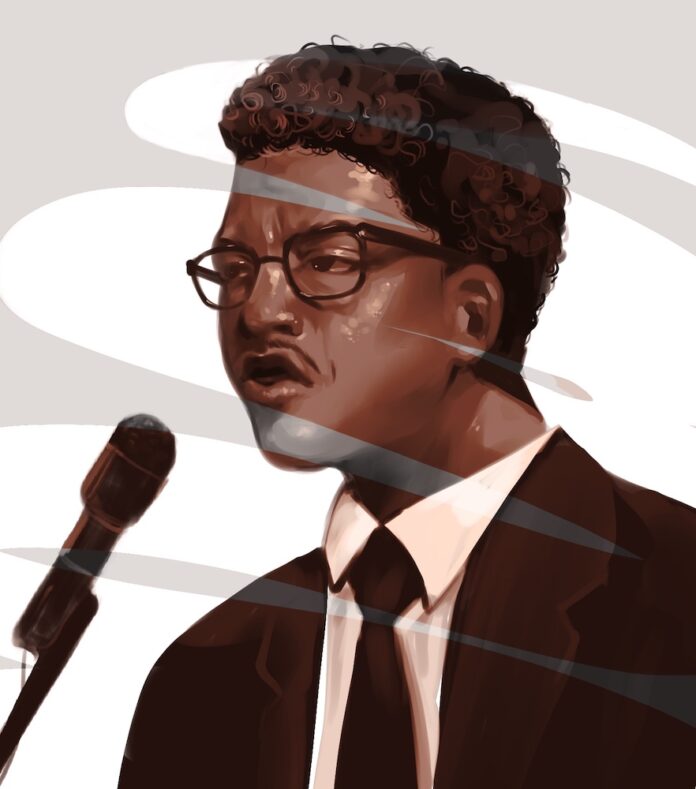There are many forgotten figures in the civil rights movement, yet the case of Bayard Rustin is unique for how prolific his work was in comparison to how little he is remembered. Rustin was the main force in organizing the March On Washington, yet his name isn’t recognizable in the same way that Martin Luther King Jr.’s is. Bayard Rustin’s reputation suffered from his very identity; Strom Thurmond, a segregationist senator, seeking to discredit Rustin, pointed to the career-ending labels that Rustin represented –– “Communist, draft-dodger and homosexual.” These associations would haunt Rustin for most of his life, yet it failed to dampen his spirits as an individual or as an actor in American history. As such, we should honor and remember him for his steadfast character and contributions to the civil rights movement.
In 1912, Bayard Rustin was born in West Chester, PA. Rustin experienced the hardships of racism as a young man and would later discover his faith through the Quakers. Rustin, during this period, discovered the writings of Mahatma Gandhi. Later, Rustin would make an effort to mainstream Gandhi’s ideas, influencing the very foundations of the civil rights movement’s reliance on nonviolence. In high school, he proved to be a brilliant student, a great athlete and a powerful singer.
After graduating, Rustin moved from Wilberforce College to study at City College of New York, where he discovered and embraced both his politics and sexuality through mixing with various artistic and radical circles. For a period, Rustin became a partisan in the Youth Communist League (YCL), the youth section of the then-influential Communist Party USA (CPUSA). Despite his later disillusionment with communism and disgust for violent revolution, it was here that Rustin learned the skills and essentials of organizing. During World War II, Rustin was sent to prison and then a Civilian Public Service (CPS) camp for refusing military service in accordance with his Quaker convictions. Even in federal prison, Rustin pushed for integration from his cell through contact with the outside world.
In the post-war years and the nation’s growing anti-communist hysteria, Rustin traveled to India, Ghana and Nigeria to see the good news of national liberation through non-violence. Rustin met various post-independence leaders such as Jawaharlal Nehru, Julius Nyerere, Kenneth Kaunda and Kwame Nkrumah.
Rustin was sentenced to 60 days in LA County jail for his homosexuality, Jan. 23, 1953, ending his work with the Fellowship Of Reconciliation (FOR). From then on, Rustin’s influence would not be public but exclusively behind the scenes, working as an organizer without the fear of Red-baiting and homophobia in the more conservative quarters of the civil rights movement.
Rustin’s pacifist activism led him to places as far as the Sahara to protest French nuclear testing and India to meet with the nation’s Gandhians. Rustin first met King Jr. through the Montgomery Bus Boycott, using his experience and intelligence to ultimately produce the first major victory of the civil rights movement and produce a formula for non-violent demonstrations.
MLK’s associates saw Rustin’s sexuality and past communist activism as threats to the movement, leading Rustin to quit working for King. Figures such as Baptist preacher Adam Clayton Powell Jr. sought to either isolate Rustin or pull him away from any possible public viewing.
The March On Washington would prove to be Rustin’s greatest achievement –– he was able to build the event, uniting often conflicting organizations such as socialists to Black Muslims to the National Association for the Advancement Of Colored People (NAACP) into a massive show of the popularity and strength of the civil rights movement. According to John Emilio’s biography about Rustin, “The Lost Prophet,” about 200,000 people showed up and, perhaps, even more striking, about one out of every hundred Black Americans attended. The March On Washington is mostly remembered for MLK’s world-historical “I Have A Dream” speech; yet it is perhaps more miraculous that such an event was possible.
Even after the incredible accomplishment of the March, Rustin had his fingers in the creation of the A Philip Randolph Institute, SNCC’s Freedom Summer and the New York City school boycott. Later in his life, Rustin worked on issues ranging from gay rights, the plight of Soviet Jews and numerous other human rights causes.
Bayard Rustin is a figure too complex to sum up in 850 words. He was elegant, urbane, charismatic and possessed courage against everything that oppressed him in a way that was almost mythical. His heart was wholly devoted to the oppressed. Rustin’s name ought to be associated with the large Pantheon of figures of the civil rights movement, a name mentioned in the same breaths of the Martin Luther King, Rosa Parks and Malcolm X. As Rustin said himself, “The Negro masses are no longer prepared to wait for anybody. …They are going to move.”
![]()































